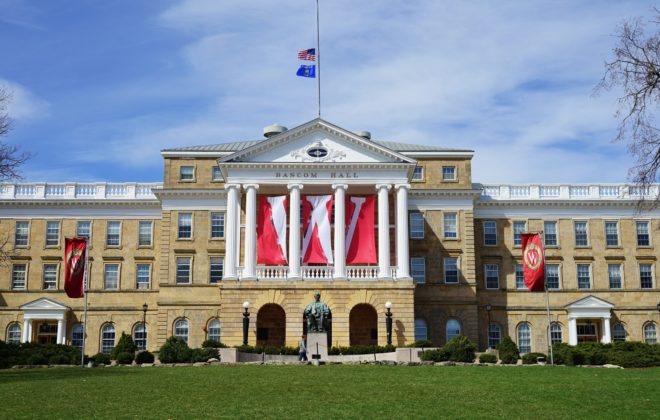Demystifying the University of Wisconsin-Madison Acceptance Rate
The University of Wisconsin-Madison is a prestigious institution known for its academic excellence and vibrant campus life.
For prospective students, understanding acceptance rates is crucial in determining the competitiveness and selectivity of universities.
This article aims to explore the factors influencing the University of Wisconsin-Madison acceptance rate and provide insights for prospective applicants.

Understanding Acceptance Rates
Acceptance rates play a significant role in the college admissions process.
They represent the percentage of applicants who are admitted to a particular university.
These rates are often used as a measure of a university’s competitiveness and selectivity.
However, it is important to note that acceptance rates should not be the sole factor in deciding where to apply.
Other admission factors, such as academic requirements, extracurricular involvement, personal essays, and recommendations, should also be considered.
University of Wisconsin-Madison Overview
The University of Wisconsin-Madison, founded in 1848, is a renowned public research university located in Madison, Wisconsin.
It offers a wide range of academic programs across various disciplines, including arts and humanities, business, engineering, and sciences.
The university is known for its strong emphasis on research and innovation, with faculty and students making significant contributions to their respective fields.
Notable achievements include pioneering research in stem cell biology, groundbreaking discoveries in astrophysics, and advancements in sustainable energy solutions.
UW-Madison also boasts a vibrant campus life with numerous student organizations, clubs, and cultural events.
The university’s commitment to providing a well-rounded education is evident in its diverse and inclusive community.
Factors Influencing Acceptance Rates at UW-Madison
Application Pool
The University of Wisconsin-Madison receives a large and diverse applicant pool each year.
The number of applications received can have a significant impact on the acceptance rate.
With a high volume of applicants, the competition for admission becomes more intense.
However, it is important to note that acceptance rates alone do not fully reflect the competitiveness of the applicant pool.
The university takes a holistic approach to admissions, considering various factors beyond just numbers.
They value diversity and aim to create a well-rounded student body, taking into account different backgrounds, experiences, and perspectives.
Academic Requirements
UW-Madison has rigorous academic standards and requirements for admission.
The university considers factors such as high school GPA, standardized test scores (SAT or ACT), and course rigor.
While there is no specific cutoff for GPA or test scores, the average academic profile of accepted students is competitive.
Prospective applicants need to showcase their academic achievements and demonstrate a strong academic foundation.
Taking challenging courses, participating in advanced placement (AP) or international baccalaureate (IB) programs, and excelling in academic pursuits can enhance an applicant’s chances of acceptance.
Extracurricular Involvement
UW-Madison values extracurricular involvement and looks for applicants who have demonstrated a commitment to their interests outside of the classroom.
Engaging in extracurricular activities, such as sports, clubs, community service, or leadership roles, can positively impact acceptance rates.
The university offers a wide range of opportunities for students to get involved, including over 900 registered student organizations.
Prospective applicants should highlight their passions, achievements, and contributions in their application, showcasing their ability to balance academics with extracurricular pursuits.
Personal Essays and Recommendations
Personal essays and recommendation letters provide an opportunity for applicants to showcase their unique qualities and experiences.
These components of the application allow admissions officers to gain insight into an applicant’s character, values, and potential contributions to the university community.
Crafting compelling essays that reflect personal growth, challenges overcome, and future aspirations is essential.
Similarly, securing strong recommendation letters from teachers, mentors, or employers who can speak to an applicant’s abilities and character can greatly enhance their chances of acceptance.
Applicants need to invest time and effort into these aspects of the application to make a lasting impression.
Demographic Considerations
The University of Wisconsin-Madison is committed to diversity and inclusion.
Demographic factors, such as race, ethnicity, socioeconomic background, and geographic location, are considered in the admissions process.
The university actively seeks to create a student body that reflects a wide range of perspectives and experiences.
They have initiatives and programs in place to support underrepresented groups and ensure equal access to educational opportunities.
Prospective applicants from diverse backgrounds should feel encouraged to apply and highlight their unique perspectives and contributions in their application.
FAQ’s:
Is UW-Madison extremely selective?
While the University of Wisconsin-Madison is a prestigious institution, it is important to provide context and dispel misconceptions about its selectivity.
The acceptance rate alone may not accurately represent the university’s true competitiveness.
The holistic admissions process considers various factors beyond just acceptance rates, and the university values applicants who demonstrate a strong fit with its academic and community values.
Prospective students should focus on presenting their best selves in the application rather than fixating solely on acceptance rates.
What is the current acceptance rate at UW-Madison?
The most recent acceptance rate data available for the University of Wisconsin-Madison may vary from year to year.
It is advisable to refer to the university’s official website or contact the admissions office for the most up-to-date information.
Additionally, it can be helpful to research acceptance rate trends over the past few years to gain a better understanding of the university’s admissions landscape.
Are out-of-state applicants at a disadvantage?
The University of Wisconsin-Madison welcomes applications from out-of-state students and does not discriminate against them in the admissions process.
While there may be a slight difference in acceptance rates between in-state and out-of-state applicants due to the university’s commitment to serving Wisconsin residents, out-of-state applicants are still considered for admission based on their merits.
The university values diversity and seeks to create a vibrant and inclusive campus community, which includes students from different states and countries.
Out-of-state applicants should focus on presenting their unique qualities, experiences, and contributions in their application to enhance their chances of acceptance.
How can I improve my chances of acceptance?
Improving your chances of acceptance at the University of Wisconsin-Madison involves a combination of factors. Here are some tips:
Focus on academic excellence: Maintain a strong GPA, take challenging courses, and perform well on standardized tests.
Engage in extracurricular activities: Participate in clubs, sports, community service, or leadership roles to demonstrate your interests and commitment outside of academics.
Showcase your unique qualities: Craft compelling personal essays that reflect your personal growth, challenges overcome, and future aspirations. Secure strong recommendation letters that highlight your abilities and character.
Highlight your diversity and experiences: Emphasize your unique perspectives, experiences, and contributions that can enrich the campus community.
Research and demonstrate a strong fit: Familiarize yourself with the university’s programs, values, and opportunities. Show how you align with UW-Madison’s academic and community goals.
What other factors should I consider when choosing a university?
While acceptance rates are important, they should not be the sole determining factor in choosing a university. Here are some other factors to consider:
Academic programs and strengths: Evaluate the programs, majors, and courses offered at the university to ensure they align with your academic and career goals.
Campus culture and environment: Consider the campus size, location, student life, and extracurricular opportunities to ensure a fulfilling college experience.
Financial considerations: Assess the cost of tuition, available scholarships, financial aid, and opportunities for part-time work or internships.
Support services and resources: Look into the availability of academic support, career services, counseling, and other resources that can contribute to your success and well-being.
Graduate outcomes and alumni network: Research the success of graduates, internship and job placement rates, and the strength of the university’s alumni network.
Conclusion:
In conclusion, understanding the acceptance rate at the University of Wisconsin-Madison is essential for prospective students. However, it is important to consider acceptance rates alongside other admission factors. Factors influencing acceptance rates at UW-Madison include the application pool, academic requirements, extracurricular involvement, personal essays and recommendations, and demographic considerations. It is crucial to debunk myths and address frequently asked questions to provide a more accurate understanding of the university’s selectivity. Ultimately, prospective applicants should focus on personal growth, finding the right fit, and presenting their best selves in the application process. A University of Wisconsin-Madison education offers a wealth of opportunities, academic excellence, and a vibrant campus community, making it a valuable choice for aspiring students.




